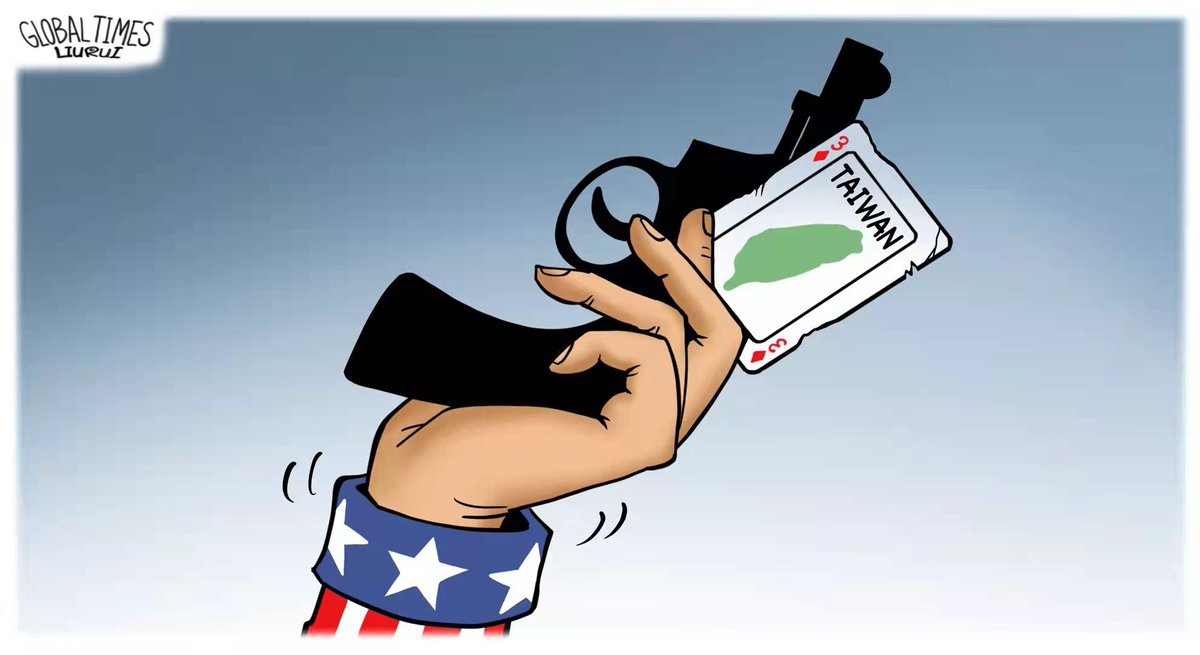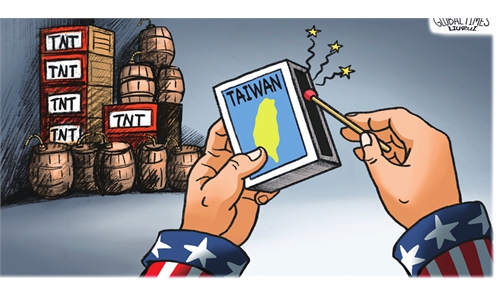US 'trade talks' with Taiwan island 'unlikely to yield substantial results'
DPP warned of paying a price for selling out islander's interests

Illustration: Liu Rui/GT
A US delegation led by Assistant US Trade Representative Terry McCartin kicked off the second round of talks with Taiwan authorities in Taipei of the so-called Initiative on 21st-Century Trade, which is expected to last until January 17. The talks, like previous ones, are not expected to yield substantial results, as they are a political show for both sides, Chinese mainland experts said.
The talks, which started on Saturday, will discuss a total of 11 major issues, with the separatist DPP authorities hoping to prioritize four issues: trade facilitation, small- and medium-sized enterprises, anti-corruption and good regulatory practices. But observers say the US will not really promote matters that will benefit the island's livelihood, but is only aimed at using the island as a pawn to counter the Chinese mainland.
The Chinese mainland on Wednesday again expressed its firm opposition to the US negotiating any agreement with Taiwan island that has sovereignty implications or is official in nature.
We urge the US to take practical actions to abide by the one-China principle and the provisions of the three joint communiqués. Attempts to play the "Taiwan card" to hinder China's reunification and national rejuvenation will not succeed, said Ma Xiaoguang, spokesperson for the Taiwan Affairs Office of the State Council on Wednesday. The DPP authorities are also warned that there will be a price to pay for the action of colluding with external forces and selling out the interests of islanders for political gains.
The initiative was launched in June 2022, shortly after the US announced the so-called Indo-Pacific Economic Framework (IPEF), which left out Taiwan island despite the DPP's eagerness to join. A couple of rounds of talks have been held, including meetings in November 2022.
Experts noted that like the previous stalemate, it seems that it will be hard for negotiations on the trade initiative to make substantial progress in this round, the underlying reason being that the US does not really expect and promote economic and trade cooperation with the Taiwan authorities, but only uses it as a pawn to counter the Chinese mainland.
"There is a huge gap between the US' goals and the expectations of the Taiwan authorities," said Wang Jianmin, a senior cross-Straits expert at Minnan Normal University in Fujian Province, noting that since the US does not want to completely anger the Chinese mainland, it will not meet DPP authorities' demands.
Echoing Wang, Tang Yonghong, deputy director of the Taiwan Research Center at Xiamen University, also pointed out that DPP's demands are unlikely to be met, citing the island's unsuccessful appeal to join the IPEF.
"The current negotiations are also a way for the US to appease the DPP authorities after the unsuccessful appeal," Tang said.
Even if a so-called economic and trade agreement can be reached, it will not be of any substantial help to Taiwan's economic and social development, Tang added.
According to public release, the initiative mainly focuses on coordination in trade facilitation, but has limited substance in terms of liberalizing economic and trade activities, such as opening up investment and trade, which means that people on both sides will not profit from the possible outcome.
The fact that the US has sent a delegation of more than 20 people to Taipei for face-to-face negotiations has been interpreted by some Taiwan-based media outlets as a sign of the rising importance of the Taiwan in the eyes of the US, and they inferred that the island will hold some bargaining power in this negotiation.
However, this is entirely wishful thinking, experts said.
"The basic pattern of concessions from the Taiwan authorities to the US in this negotiation is unlikely to change, considering the unequal power and status of the two sides," Wang told the Global Times on Sunday. "With the US currently hoping to use the island of Taiwan to suppress and confront the Chinese mainland, it is possible that the US will make concessions in some areas. But 'America first' would be the basic pattern of negotiations."
Observers noted that despite the fact that the talks would not lead to substantive results, the Taiwan authorities are still willing to engage in the negotiations because it is a much needed political show.
The Chinese Foreign Ministry has sent warnings over this political maneuvering as early as June 2022, when the so-called initiative was first announced.
"There is but one China in the world. Taiwan is an inalienable part of China's territory… If the US insists on playing the Taiwan card, it will only lead China-US relations to a dangerous situation," Zhao Lijian, former spokesperson for the ministry, said at the routine press conference.

